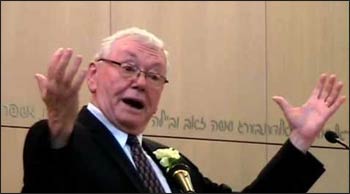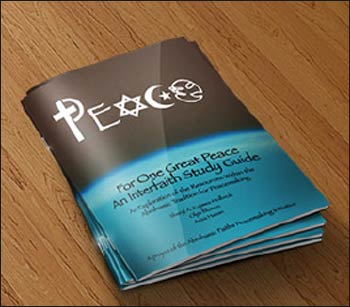Editorial
OVERCOMING OUR PREJUDICES AGAINST ETHNIC AND RELIGIOUS GROUPS
By Leslie Mezei, June 15, 2013
The June 24 Toronto Star column by Dow Marmur, Rabbi Emeritus of Holy Blossom Temple, is titled “Roma refugees should be welcomed, not rebuffed,” and it starts out "Jews and Roma both endured the Holocaust, which explains the Jewish community’s new refugee advocacy initiative.” In the article, Rabbi Marmur writes the following:

Rabbi Dow MarmurMany immigrants whose children and grandchildren now shape the policies of this country were once viewed with no less suspicion than the Roma are now. The same reprehensible qualities that are being pinned on them had been pinned on previous new arrivals, e.g., the Irish, the Italians and, of course, the Jews fleeing Czarist pogroms and Nazi extermination camps.
That’s one reason why many members of the Jewish community are anxious to be of help. Non-Jewish activists like Mary Jo Leddy of Romero House in Toronto report that a disproportionate number of volunteers are Jews.
Earlier this month, Leddy chaired a panel at Holy Blossom Temple in Toronto about the plight of the Roma. The panelists were Gina Csanyi-Robah, the director of the Roma Community Centre; Anna Porter, who has written about post-Communist Europe and the fate of Jews in her native Hungary during the Holocaust; and Bernie Farber, the former CEO of the Canadian Jewish Congress.
The Nazis sent Jews and Roma (the “Gypsies”) to the same gas chambers. Like Jews, many Roma are Holocaust survivors. Jews who have found a home in Canada are now trying to reach out to the Roma as well as to all other refugees. That’s behind the new Jewish countrywide advocacy initiative that was launched last Friday in Toronto.
Stephen Lewis, former Canadian ambassador to the United Nations, will lead a team of committed volunteer activists under the banner of the Jewish Refugee Action Network. Its stated goal is “to restore Canada’s humanitarian tradition and democratic principles to refugees.” The organizers are appealing for wide “multi-faith and multicultural support.” (See here for the complete article.)
This strikes many chords with me. I am a Holocaust survivor from Hungary myself. The other children were chasing us with the cry of “dirty Jew” ever since I can remember, and my father was a victim of the gas chambers of Auschwitz. I fully empathize with T. Sher Singh in the article below as he celebrates the decision of his parents to come to Canada. As a refugee, I had little choice, but consider myself very lucky in landing here. But truth be told, I came to a Canada in 1948, which still had quite a bit of anti-Semitism of its own. Discrimination in hiring for good positions was practiced against many groups. When I joined a life insurance company towards the end of the 1950s, I was told that ten years before they would not even have hired Catholics.
We have made a great deal of progress since then: multiculturalism became a national policy, and Toronto, with its “Diversity Our Strength” motto, will be welcoming the NAIN2013 conference next month. I consider it a great privilege, therefore, that I have had the opportunity to work for multifaith unity here for the last twenty years. By being in close contact with so many of the growing Canadian and worldwide interfaith activities, I’ve also been a newsletter editor for eleven years and made many wonderful friends in the process.
And yet, the situation of the Roma today reminds us that all of us are still in danger of being subject to prejudices we are not even aware of. The same Rabbi Dow Marmur elsewhere quotes Krister Stendahl, a former dean of the Harvard Divinity School and a bishop in Sweden, “People engaged in interfaith work should always compare the best in their own religion with the best in that of others. “ And the same is true of ethnic groups, especially here in Canada, the home of the Global Centre for Pluralism, where we have the opportunity to live together in peace and unity, and work on overcoming the prejudices and enmities of our original lands.
This is a good time for us to listen to Karen Armstrong, whose Charter for Compassion organization wants to establish 100 Compassionate Cities around the world:
The principle of compassion lies at the heart of all religious, ethical and spiritual traditions, calling us always to treat all others as we wish to be treated ourselves. Compassion impels us to work tirelessly to alleviate the suffering of our fellow creatures, to dethrone ourselves from the centre of our world and put another there, and to honour the inviolable sanctity of every single human being, treating everybody, without exception, with absolute justice, equity and respect.

The International Campaign for Compassionate Cities is a global campaign inspired by the Golden Rule (treat all others as you wish to be treated yourself) to raise awareness of the benefits of compassionate action. Its purpose is to encourage city leadership from around the world to create and bring together efforts towards increasing compassion through local initiatives, policy, and projects.
My hope is that a number of Canadian cities will take on this challenge, with the help of the various interfaith councils and other organizations supporting diversity and unity.
NEWS
How an Immigrant Family Chose Canada, and Celebrates the Decision
“A Country Called Canada”
T. Sher Singh, Huffington Post Canada, July 1, 2013
T. Sher Singh is the Editor of sikhchic.com, an online daily magazine on the art and culture of the Sikh diaspora. In this article he describes how his parents traveled the world in the late 1960s to find a new home, as they saw “religious chauvinism and fundamentalism had begun to rear its ugly head again” in India.
* * *
T. Sher Singh
Japan won the top grade amongst all the lands my parents had visited. But there were language issues. And it was not conducive to immigration. The U.S. was equally appealing, but its crime-rate was bothersome. They had even considered Australia and Brazil as possible options, but each lost out for one reason or the other. Europe was attractive, but language and racial barriers were a turn-off. Canada? Everything about it was marveilleaux!” …
Not a day has gone by since then that we haven’t felt blessed that we not only had the good fortune – which included the incredible foresight shown by my parents – to leave India on time, before it sank dramatically into a mire of corruption, violence and fundamentalism, but also the gift of a new home in, of all places, Canada! There hasn't been a moment of regret, ever, not once, or of doubt, not even when the going got tough ... each one of us will readily confess to you…
Sure, Canada wasn’t perfect. It had its fair share of challenges, and we had indeed felt the brunt of many of them as we struggled, particularly in the early years. But not a day went by when we didn't feel, deep in our heart of hearts, that this was as close to heaven as you can get on earth…
RESOURCES
Interfaith Curriculum for Peacemaking
by Abrahamic Faiths Peace Initiative (California, USA)

This excellent resource enables participants to acquire basic skills in interfaith dialogue and to build bridges across religious and cultural differences. The 74-page curriculum is published by the Abrahamic Faiths Peacemaking Initiative and authored by learned practitioners of three religious traditions. Three of the sessions focus on peacemaking in Judaism, Christianity, and Islam. Also included are guidelines for interfaith leaders, reflective exercises, background information sources, suggestions for further readings and excellent tips for practicing interfaith hospitality. The curriculum is also an important resource for those who are not members of the Abrahamic faiths. The document is available as a Kindle e-book (96 cents).
It is also available free on the interfaith section of the Scarboro Missions website, which is full of interfaith and Golden Rule goodies.

